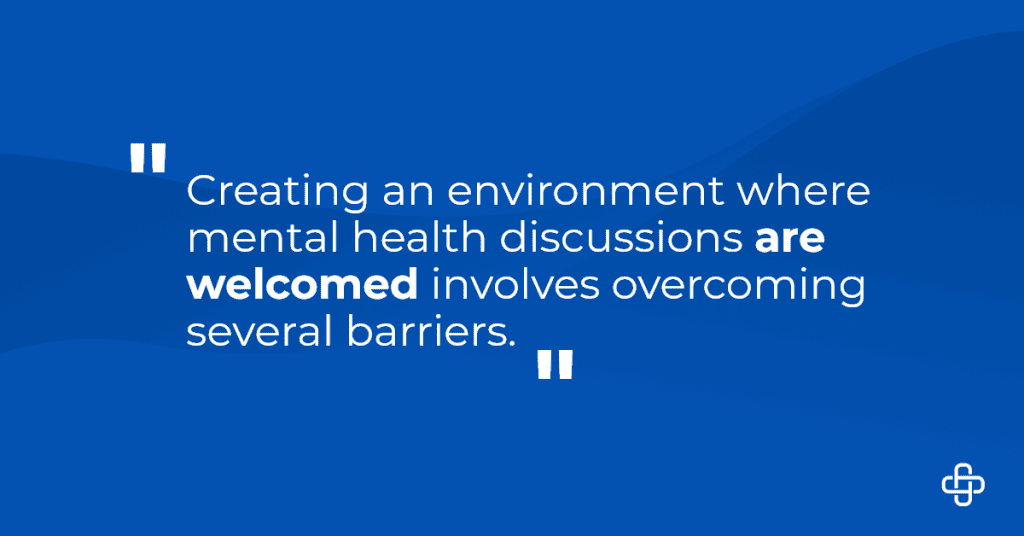Did you know that according to a recent study, nearly one in five adults in the workforce experiences a mental health condition each year?
This staggering statistic underlines the critical importance of creating safe spaces for mental health discussions within the workplace.

Why are safe spaces important for mental health discussions at work?
Mental health issues, such as stress, anxiety, and depression, can affect an employee’s ability to perform their duties effectively.
These issues not only impact the individual but also have a significant impact on team dynamics and overall workplace culture.
By creating safe spaces for mental health discussions at work, organizations can actively address and support the well-being of their employees.
Understanding the Need for Mental Health Discussions
Recent statistics highlight a concerning trend: a significant portion of the workforce experiences mental health challenges, yet many remain silent due to stigma, fear of judgment, or lack of support structures within their workplace.
This silence not only exacerbates individual suffering but also impacts workplace dynamics, leading to decreased productivity, increased absenteeism, and higher risks of accidents.
Creating an environment where mental health discussions are welcomed involves overcoming several barriers.
Creating Safe Spaces for Mental Health Discussion at Work
For HR managers and employers, creating these safe spaces means actively fostering an environment where employees feel comfortable discussing their mental health without fear of reprisal.
This can be achieved through several strategies:
- Proactive Communication: Regularly communicate the importance of mental health and the support available to employees.
- Training and Support: Provide training for managers and support staff on how to handle mental health discussions sensitively and effectively.
- Resources and Tools: Equip the workplace with resources and tools that employees can access for managing mental health issues, including access to professional counseling services.
Benefits of Safe Spaces at Work
Establishing safe spaces for mental health discussions at work yields numerous benefits:
- Enhanced Employee Well-being: Prioritizing mental health discussions helps in early identification and support for those struggling, leading to improved overall well-being.
- Increased Productivity: Employees feeling mentally supported are more engaged and productive, contributing positively to the organization’s goals.
- Reduced Absenteeism: Safe environments lower the stress that leads to mental health days off, thus reducing absenteeism rates.
- Positive Workplace Culture: Open discussions about mental health foster a culture of empathy and understanding, enhancing team dynamics.
- Attraction and Retention of Talent: Organizations known for their supportive work environments are more attractive to prospective employees and tend to retain talent for longer periods.
- Decreased Healthcare Costs: Supportive mental health initiatives can lead to decreased healthcare claims and costs associated with long-term mental health issues.
- Stigmatization Reduction: Normalizing mental health conversations dismantles stigma and fosters a more inclusive workplace.
- Increased Innovation and Problem-Solving: A mentally healthy and supportive work environment encourages creativity and effective problem-solving among teams.
Overcoming Challenges
Addressing stigma and misconceptions about mental health is critical to integrating mental health discussions into workplace culture.
Organizations must lead by example, demonstrating through actions that mental health is a priority.
This involves regular training, open forums for discussion, and visible support from top management.
Overcoming these challenges will help create a culture of inclusivity and support for all employees.
Cultivating Empathy and Understanding
Creating empathetic workplaces that support mental health conversations is crucial.
This involves intentional actions and policies that focus on emotional well-being, with leaders advocating for mental health, sharing stories, and showing genuine concern for employees’ mental states.
Promoting understanding of mental health issues through awareness sessions, workshops, and expert talks can demystify conditions, fostering empathy and encouraging help-seeking behavior.
A proactive, empathetic, and understanding approach to mental health at work not only aids in removing the stigma associated with these discussions but also strengthens the fabric of the workplace community.
It empowers individuals to come forward without fear, fostering a culture of support that benefits the entire organization.
Measuring Success
Successfully integrating mental health discussions into the workplace culture requires not only the implementation of supportive measures but also the ability to measure their impact.
To gauge success, organizations should consider both qualitative and quantitative metrics:
- Employee Feedback: Regular surveys and feedback mechanisms can provide invaluable insights into how employees perceive the mental health support provided. Anonymous feedback tools can encourage candidness and ensure an accurate assessment of the initiative’s reception.
- Utilization Rates: Monitoring the usage rates of mental health resources and services offered, such as counseling sessions, workshops, and support programs, can serve as a tangible measure of engagement and perceived value among employees.
- Health and Performance Metrics: Reductions in absenteeism, turnover rates, and instances of workplace conflict, alongside improvements in productivity and employee engagement scores, can indicate a positive shift towards a healthier workplace environment.
- Continuous Improvement Processes: Establishing a continuous feedback loop is crucial. This involves regularly reviewing and adjusting strategies and programs based on outcomes and feedback to enhance effectiveness and address emerging needs.
By proactively measuring the success of mental health initiatives, organizations can refine their approach, demonstrating a genuine commitment to employee well-being.
This commitment, in turn, fosters a resilient and supportive workplace culture where every individual feels valued and understood.
Conclusion
The importance of creating safe spaces for mental health discussions in the workplace cannot be overstated.
By taking proactive steps to support employees’ mental well-being, businesses can foster a culture of openness, trust, and respect that benefits everyone involved.
We encourage everyone to take action in supporting employees’ mental health and invite employers and employees to watch Axiom Medical’s free webinar replay of “Stress to Strengthened: Techniques for Managing Workplace Anxiety.”
Together, we can transform our workplaces into environments where mental health is prioritized, discussed openly, and managed effectively.
Charli Pedersen is a published writer featured on Axiom Medical’s blog. She holds a bachelor’s degree in English, Professional and Technical Writing, and has experience creating content for businesses and non-profit organizations.










